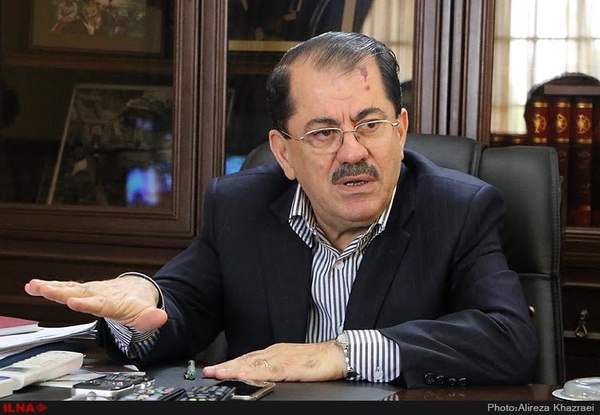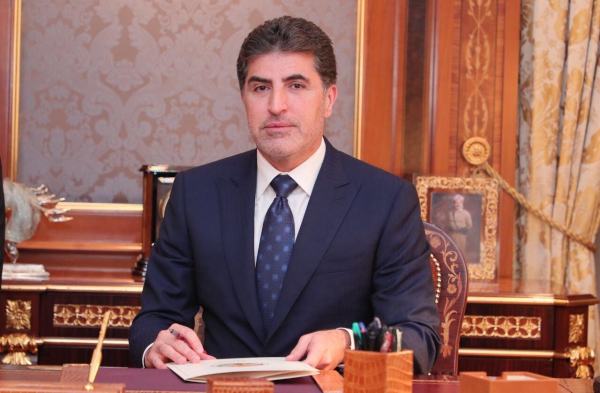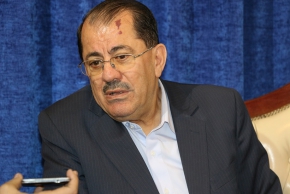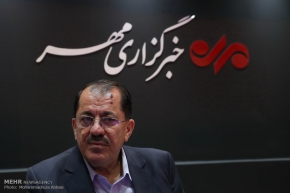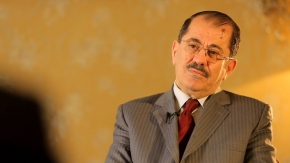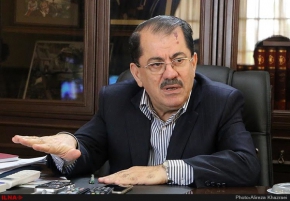KRG rep. says Gen. Soleimani helped Kurdistan to fight ISIS
Kurdistan Regional Government (KRG) representative in Tehran says that martyr. Gen. Qasem Soleimani helped Iraqi Kurdistan by sending weapons and military advisers to defeat ISIS.
Describing Iran’s role in the fight against terrorism as “vital” and effective”, KRG representative in Tehran reiterated that martyr. Gen. Qasem Soleimani helped Iraqi Kurdistan by sending weapons and military advisers to defeat ISIS.
“Martyr Qasem Soleimani not only helped in the framework of consultation but also in the battlefield,” Nazim Dabbaq tells the Tehran Times. “We are thankful and appreciative for Iran’s advisory presence and its arms aid to eliminate the Daesh threat from Erbil.”
The following is the text of the interview:
How do you assess the role of Iran and General Qasem Soleimani in supporting the Iraqi Kurdish Region to confront ISIS (Daesh)? Kurdish leaders say that Qasem Soleimani provided weapons for Arbil when Daesh invaded Iraq.
As you mentioned, in fact, the officials of the Iraqi Kurdistan, including Mr. Masoud Barzani, have emphasized that Iran's role in the fight against terrorism in Iraq has been vital and important.
Martyr Qasem Soleimani did not only help in the framework of consultation, but also in the battlefield. He helped the Iraqi Kurdistan in its combat against terrorism. We are thankful and appreciative for Iran’s advisory presence and its arms aid to eliminate the Daesh threat from Erbil.
Given the geopolitical situation in West Asia and the looming threats in the region, how do you assess Iran's role in stabilizing and combating terrorism?
Iran has a special position due to its geopolitical situation in the region, especially in the war against terrorism including Daesh. Tehran played an important role.
Indeed, the Islamic Republic of Iran has historically played this role, both during the 8-year war imposed by Saddam Hussein and in the midst of the war against Daesh. Iran has played a constructive role that has brought security and stability to the region.
I have said many times that if it were not for Iran, after the fall of Mosul, Daesh could have captured Baghdad as well as the Kurdistan region, but fortunately, the Islamic Republic and other allies made every effort to be helpful and effective which are commendable.
Iran has been a victim of terrorism since the victory of the Islamic Revolution and has gained valuable experience in this regard. What are the significance and effect of efforts made by commanders such as Martyr Soleimani to contain the chaotic situation in the region?
Iran, especially after the victory of the Islamic Revolution and years of experience in fighting terrorism and confronting various enemies, could create a kind of solidarity and unity among people.
In one of Soleimani’s speeches, I heard him spoke about the role of martyrs and leadership in deterring enemies. In his view, the leadership plays a pivotal role in mobilizing the people to support the revolution and help it to continue and defeats its foes, because the people need leaders on the battlefield who are brave and wise, as Soleimani was. This experience made peoples of the region always ready to fight terrorism under the command of leaders such as Martyr Qasem Soleimani, and we have witnessed this fact.
What characteristics did make General Soleimani popular in the region and make him attract people with different religions and views?
If we want to talk about the characteristics and personality of people like Qasem Soleimani, we must mention that he was a faithful person, honest, brave.
Until the day he was martyred, he believed in his cause and was proud of it. I remember one day some of his friends warned him about the US attempts to assassinate him and called on him to be more careful. He laughed and said that we are made for martyrdom and we are waiting to see when we will be martyred. These characteristics were the reason for his popularity. He did not pursue personal interests or power, but rather fought for his goals and aspirations.
Why did some Western states like the U.S put someone like Qasem Soleimani, who was fighting Daesh, on the list of terrorists?
Defining terrorism or attributing terrorism to a country or person, or accusing a country or person of supporting terrorism, is made based on the interests of countries. Western and European countries have one policy and Iran has another, but in general, I think the people are entitled to give a real definition.
When the people of Iran or Iraq are satisfied with their own governments, it makes the Western definition unreliable. It is the stance and approval of the people of a country that rejects or approves these definitions.
How do you describe Qasem Soleimani's relations with Kurdish leaders and Kurdish groups or organizations?
My acquaintance with martyr General Qasem Soleimani dates back to 1991 after the uprising of the people of Kurdistan. Certainly, his politico-military position led to good relations with the officials, leaders, and political groups of the Kurdistan region.
These relations were to such an extent that when martyr Soleimani was seen with one of the Kurdish leaders, especially Mr. Talabani and Mr. Barzani, we did not feel distant, but we felt a sense of friendship and honesty.
Tehran Times
https://kurdpress.com/en/news/291/KRG-rep-says-Gen-Soleimani-helped-Kurdistan-to-fight-ISIS/
Reporter's code: 50101
Kurdistan Region President’s message on the occasion of Eid al-Fitr
Erbil, Kurdistan Region, May 12, 2021
The President of the Kurdistan Region, Nechirvan Barzani, issued a congratulatory statement on Wednesday as Muslims around the world prepare to celebrate the end of the holy month of Ramadan. The following is the message:
On the occasion of the Eid- al Fitr, I extend my warmest congratulations to the families of our fallen heroes and all Muslims in Kurdistan, Iraq and around the world. I hope this celebration will bring peace and prosperity to everyone, and I hope that our future celebrations are held in better conditions without pandemics, hardships and crises.
As we begin to celebrate the Eid al-Fitr, let us use this occasion to further consolidate peace, tolerance and reconciliation among ourselves and with our fellow citizens. Let us open a new chapter of partnership and mutual respect to serve our people and our country towards a better future for all in which peace, stability, human rights and freedoms, law and justice are better protected.
Let us use this occasion as an opportunity to end enmities among us and start working together towards resolving the differences among all our parties and communities.
Happy Eid al-Fitr. I wish everyone good health.
Nechirvan Barzani
The President of the Kurdistan Region
Iran summons KRG representatives over controversial stamp
TEHRAN – The Iranian Foreign Ministry has summoned the representative of Iraq’s Kurdish Regional Government over a controversial stamp design in Iraqi Kurdistan breaching Iran’s territorial integrity.
Nazem Dabbagh, the Kurdish Regional Government (KRG) representative to Tehran, told the Iraqi Kurdish Rudaw news agency that Iranian officials have summoned him over the stamp and informed him that it is “a violation of Iran’s sovereignty.”
The stamp in question raised eyebrows in the region, causing tensions between the KRG and a number of regional countries.
It has two problems: First, there was no Arabic translation of what was written on the stamp, something that drew criticism from some Iraqi groups as Arabic is the official language of Iraq. Second, the stamp featured a map imagining large swathes of Iranian territories – as well as Turkish ones - as part of the Greater Kurdistan, a clear violation of Iran’s territorial integrity.
The stamp was published to commemorate the recent four-day papal visit to Iraq that included a foray into Erbil, the capital of Iraqi Kurdistan, on the third day.
Upon his arrival in Erbil, the pope was welcomed by the president and the prime minister of the autonomous region of Iraqi Kurdistan, as well as civil and religious authorities, according to Vatican News. He then met with the President of the autonomous region of Iraqi Kurdistan, Nechirvan Barzani, and the Prime Minister, Masrour Barzani at the Presidential VIP Lounge of the airport.
Dabbagh denied that Iran had hinted at any threats, saying, “We made clear to the Iranians that the aforementioned stamp is one of several examples presented by artists.”
According to the Kurdish official, Iran knows that the stamp is not officially presented by the KRG. Dabbagh pointed out that the Iranian official in charge of the Iraq file in the Iranian Foreign Ministry spoke with him respectfully “and asked me for an explanation of what happened, and he told me that he does not wish to delve much into what happened, but this does not serve the interest of the current policy of the Kurdish Regional Government, as it affects Iran's lands, so we want you to provide an explanation.”
Dabbagh said he responded to the Iranian official by saying that the stamp “is not the work of the Kurdish Regional Government, but a group of artists who proposed these models to the Ministry of Transport and Communications, and the Kurdish Regional Government has shown its commitment to the Iraqi constitution and human rights considerations.”
According to Dabbagh, the Iranian Foreign Ministry accepted his clarification and confirmed the delivery of a message to Iraq.
Last week, Saeed Khatibzadeh, spokesman for Iran’s Foreign Ministry, said that the stamp runs counter to international regulations.
“It’s obvious that what was publicly published goes against international principles and regulations,” Khatibzadeh was quoted by state news IRNA as saying on Wednesday. “We have expressed our objection to the government of Iraq and demanded the immediate recall and correction of this unfriendly act.”
https://www.tehrantimes.com/news/459176/Iran-summons-KRG-representatives-over-controversial-stamp
Gen. Soleimani helped Kurdistan to fight ISIS
Nazim Dabbagh the Kurdistan Regional Government (KRG) representative in Tehran had an exclusive interview with TehranTimes, during which he shared his view on General Qassem Soleimani and his role in the fight against terrorism in Iraq.
video : https://www.tehrantimes.com/news/456677/Gen-Soleimani-helped-Kurdistan-to-fight-ISIS
Kurds should not forget Iran's support in fighting against ISIS: representative
Representative of the Kurdistan Regional Government (KRG) in Tehran Nazim Dabagh said on Monday, January 25, that the Kurds should not forget the aid provided by Iran during the war against Islamic State (ISIS), arguing that ISIS would have occupied Baghdad if it were not for the Islamic Revolutionary Guard Corps (IRGC) and Quds Force Commander Qassem Soleimani.
Dabagh told NRT in an interview that when the Peshmerga and advisors from the IRGC arrived in the Hamrin Mountains, Soleimani said to the Peshmerga “here is Hamrin Mountain; this is your border, defend it for Mam Jalal,” referring to the late Patriotic Union of Kurdistan (PUK) leader Jalal Talabani.
Earlier this week, the Masir media agency in Iran released a short film featuring a dramatized version of Soleimani’s cooperation with the Kurdistan Region during the ISIS war, which provoked intense criticism from the Kurdistan Democratic Party (KDP) for its depiction of party leader Masoud Barzani.
Dabagh, who is a member of the PUK, said that the KDP has the strongest ties with Iran of all of the political parties in the Kurdistan Region, but added that the film concerned the KRG and noted that the depiction of Barzani had been condemned by some Iranian officials.
“The Iranian government has promised us to follow up about the release of the film and that the release of the film about Masoud Barzani has not been done by an official organ of the Iranian government,” he said.
Reporter's code: 50101
https://kurdpress.com/en/news/392/Kurds-should-not-forget-Iran's-support-in-fighting-against-ISIS:-representative/
Implicating CTG in killing Soleimani to sow sedition btw PUK, Iran
KRG rep. says Gen. Soleimani helped Kurdistan to fight ISIL
TEHRAN, Jan. 04 (MNA) – Kurdistan Regional Government (KRG) representative in Tehran says that martyr. Gen. Qassem Soleimani helped Iraqi Kurdistan by sending weapons and military advisers to defeat ISIL.
Describing Iran’s role in the fight against terrorism as “vital” and effective”, KRG representative in Tehran reiterated that martyr. Gen. Qassem Soleimani helped Iraqi Kurdistan by sending weapons and military advisers to defeat ISIL.
“Martyr Qassem Soleimani not only helped in the framework of consultation but also in the battlefield,” Nazim Dabbagh tells the Tehran Times. “We are thankful and appreciative for Iran’s advisory presence and its arms aid to eliminate the Daesh threat from Erbil.”
The following is the text of the interview:
How do you assess the role of Iran and General Qassem Soleimani in supporting the Iraqi Kurdish Region to confront ISIL (Daesh)? Kurdish leaders say that Qassem Soleimani provided weapons for Arbil when Daesh invaded Iraq.
As you mentioned, in fact, the officials of the Iraqi Kurdistan, including Mr. Massoud Barzani, have emphasized that Iran's role in the fight against terrorism in Iraq has been vital and important.
Martyr Qassem Soleimani did not only help in the framework of consultation, but also in the battlefield. He helped the Iraqi Kurdistan in its combat against terrorism. We are thankful and appreciative for Iran’s advisory presence and its arms aid to eliminate the Daesh threat from Erbil.
Given the geopolitical situation in West Asia and the looming threats in the region, how do you assess Iran's role in stabilizing and combating terrorism?
Iran has a special position due to its geopolitical situation in the region, especially in the war against terrorism including Daesh. Tehran played an important role.
Indeed, the Islamic Republic of Iran has historically played this role, both during the 8-year war imposed by Saddam Hussein and in the midst of the war against Daesh. Iran has played a constructive role that has brought security and stability to the region.
I have said many times that if it were not for Iran, after the fall of Mosul, Daesh could have captured Baghdad as well as the Kurdistan region, but fortunately, the Islamic Republic and other allies made every effort to be helpful and effective which are commendable.
Iran has been a victim of terrorism since the victory of the Islamic Revolution and has gained valuable experience in this regard. What are the significance and effect of efforts made by commanders such as Martyr Soleimani to contain the chaotic situation in the region?
Iran, especially after the victory of the Islamic Revolution and years of experience in fighting terrorism and confronting various enemies, could create a kind of solidarity and unity among people.
In one of Soleimani’s speeches, I heard him spoke about the role of martyrs and leadership in deterring enemies. In his view, the leadership plays a pivotal role in mobilizing the people to support the revolution and help it to continue and defeats its foes, because the people need leaders on the battlefield who are brave and wise, as Soleimani was. This experience made peoples of the region always ready to fight terrorism under the command of leaders such as Martyr Qassem Soleimani, and we have witnessed this fact.
What characteristics did make General Soleimani popular in the region and make him attract people with different religions and views?
If we want to talk about the characteristics and personality of people like Qassem Soleimani, we must mention that he was a faithful person, honest, brave.
Until the day he was martyred, he believed in his cause and was proud of it. I remember one day some of his friends warned him about the US attempts to assassinate him and called on him to be more careful. He laughed and said that we are made for martyrdom and we are waiting to see when we will be martyred. These characteristics were the reason for his popularity. He did not pursue personal interests or power, but rather fought for his goals and aspirations.
Why did some Western states like the U.S put someone like Qassem Soleimani, who was fighting Daesh, on the list of terrorists?
Defining terrorism or attributing terrorism to a country or person, or accusing a country or person of supporting terrorism, is made based on the interests of countries. Western and European countries have one policy and Iran has another, but in general, I think the people are entitled to give a real definition.
When the people of Iran or Iraq are satisfied with their own governments, it makes the Western definition unreliable. It is the stance and approval of the people of a country that rejects or approves these definitions.
How do you describe Qassem Soleimani's relations with Kurdish leaders and Kurdish groups or organizations?
My acquaintance with martyr General Qassem Soleimani dates back to 1991 after the uprising of the people of Kurdistan. Certainly, his politico-military position led to good relations with the officials, leaders, and political groups of the Kurdistan region.
These relations were to such an extent that when martyr Soleimani was seen with one of the Kurdish leaders, especially Mr. Talabani and Mr. Barzani, we did not feel distant, but we felt a sense of friendship and honesty.
First Time Published in Tehran Times
Kurdistan Region President meets with Iraq’s Parliament Speaker
Erbil, Kurdistan Region, May 3, 2021
Kurdistan Region President Nechirvan Barzani received Mr. Muhammad Al-Halbousi, the Speaker of Iraq’s Parliament, in Erbil on Monday.
Discussions covered the developments in the country, the upcoming general elections and their anticipated impact on the political process in Iraq, Erbil-Baghdad relations, the threat of ISIS and its recent movements, cooperation and coordination among the parties to ensure security and stability, and the situation in the wider region.
The importance of collective national efforts of all parties to confront the challenges facing the country and surpassing the crises was reaffirmed. It was underlined that unity and consensus paves the way for lasting peace and stability in Iraq. The two sides also expressed hope that the upcoming elections will meet the aspirations of people for stability, improved public services and livelihoods for all citizens.

Kurdistan Region President receives UK Ambassador to Iraq
Erbil, Kurdistan Region, April 21, 2021
Kurdistan Region President Nechirvan Barzani received United Kingdom’s Ambassador to Iraq, Mr. Stephen Hickey, and his accompanying delegation, in Erbil on Wednesday.
Discussions included ISIS resurgence and its threats against stability and peace in the country. President Nechirvan Barzani commended the important role of the International Coalition in supporting Iraq and the Kurdistan Region against terrorism, the complete elimination of ISIS networks, and the need for coordination and cooperation between Erbil and Baghdad with the coalition partners.
The President underlined the importance of a common vision for all parties in Iraq to improve the living conditions of fellow citizens following past years economic downfalls and hardships.
The UK delegation expressed concerns over the attacks that targeted the Kurdistan Region recently, especially the city of Erbil, and strongly condemned the attacks which undermine peace and stability in Iraq.
Other topics of discussions included the relations of Iraq and the Kurdistan Region with the United Kingdom, the President’s recent visit to Baghdad and Erbil-Baghdad relations. The meeting valued the ratification of the Iraqi Budget Law and the agreement on the issue of the Federal Court.
Discussions also covered the efforts of the Kurdistan Region Presidency to bring the political parties together, the upcoming Iraqi elections, the role of the international community in solving the problems of Iraq, strengthening state institutions and benefiting from international support, the economic situation of Iraq, the impact of COVID-19 pandemic and the status of the displaced people and refugees hosted in camps in Kurdistan Region.

President Nechirvan Barzani reaffirms the need for a common vision for the future of Iraq
Baghdad, Iraq, April 12, 2021
On the third and last day of his visit to Baghdad, Kurdistan Region President Nechirvan Barzani held separate meetings with the leaders of the Iraqi political parties and groups, including Mr. Salim al-Jubouri, Head of the Civil Assembly for Reform, Mr. Adel Abdul-Mahdi, former Prime Minister, Mr. Hammam Hammoudi, Head of the Islamic Supreme Council, Mr. Iyad Allawi, Secretary General of the National Accord Party, and Khamis al-Khanjar, Head of the al-Azm Alliance.
During these meetings, discussions focused on the latest political and security developments in the country, the upcoming Iraqi elections, the Kurdistan Region’s relations with the Iraqi Federal Government, dialogue to solve the problems of Erbil-Baghdad, the dangers of ISIS and Iraq’s relations with the countries of the region and the world.
President Nechirvan Barzani stressed in the meetings that his vision for the resolution of the issues in Iraq, requires the need for political parties and communities in the country to reach a common vision and understanding for the future of Iraq that includes stability, coexistence, and mutual respect. In order to achieve this objective, everyone must learn from the mistakes and experiences of the past. The President referred to Baghdad as the strategic partner of the Kurdistan Region to solve the outstanding problems.
The President reaffirmed that eighteen years have passed since the fall of the former Iraqi regime and the building of the new Iraq, the transitional phase, must come to an end and a new phase be launched in the country in which the human and natural wealth of Iraq be utilized for further reconstruction of the country, to provide enhanced services to all Iraqi’s throughout the country and to restore Iraq and its position at the regional and global levels.
In this context, Iraq’s leaders shared President Nechirvan Barzani’s opinion to work with a common vision for a better future for Iraq, and agreed that with the existing political will and a common understanding, obstacles can be removed before the political process, as shown in the case of the passage of the Iraqi Budget Bill, the amendment of the Federal Supreme Court Law and the laws concerning dissolution of the parliament.
The Iraqi groups and parties viewed President Nechirvan Barzani’s visit to Baghdad as an opportunity to resume the contact among political groups and their joint work to move the country towards a better position that would ensure stability, reconstruction, progress and partnership with all sides in the political process and management of the country on the basis of citizenship and common interests. Iraq’s leaders expressed hope that the visit yields genuine results and that such visits and meetings continue to unify common positions and build a basis for mutual understanding.


More...
Latest News
- President Nechirvan Barzani in Vienna: Austria aims to enhance diplomatic and trade relations
- Kurdistan Region President meets with President of Austria
- President Nechirvan Barzani meets with Foreign Minister of Austria
- President Erdoğan reaffirms Türkiye’s continued support for Iraq and the Kurdistan Region
- President Nechirvan Barzani’s message on the 126th anniversary of Kurdish journalism
- President Nechirvan Barzani at the Sulaimani Forum: The country must bring us all together
- President Nechirvan Barzani meets with European Union Ambassador
- President Nechirvan Barzani receives French Ambassador
- President Nechirvan Barzani visits Iranian Consulate General to pay respects to victims of Kerman terrorist attack
- President Nechirvan Barzani receives outgoing French Ambassador
- President Nechirvan Barzani condemns terrorist bombings in Iran
- President Nechirvan Barzani meets with US Deputy Secretary of State
- President Nechirvan Barzani’s New Year Address
- KRG Prime Minister Meets with US Deputy Secretary of State
- KRG Prime Minister Engages in Key Talks with UNAMI Chief
- KRG Prime Minister Hosts Diplomats from Iraq and Kurdistan Region
- KRG Prime Minister Meets with the UN’s Secretary-General at COP28
- President Nechirvan Barzani meets with Turkish Ambassador
- KRG Prime Minister Welcomes UK Military Delegation
- President Nechirvan Barzani meets with UK Chief of the Defense Staff’s Senior Middle East Advisor
- KRG Prime Minister Discusses Regional Issues and Domestic Policies in Special Panel
- KRG Prime Minister Meets with Former British Prime Minister
- MEPS Forum in Duhok Highlights Climate Change Among Key Global Challenges
- KRG Prime Minister Meets with United Nations Delegation
- President Nechirvan Barzani and French Ambassador discuss the situation in Iraq and the region
- President Nechirvan Barzani meets with Head of the Independent Strategic Review of UNAMI
- KRG Prime Minister Inaugurates 5th International Trade Fair for Industry and Construction
- KRG Prime Minister Meets Qatar's Consul General
- President Nechirvan Barzani meets with Iraq’s Oil Minister
- KRG Prime Minister Welcomes Cardinal Sako of the Chaldean Catholic Church

